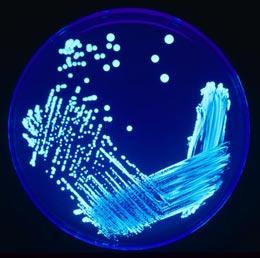Destruction of specimens leaves legislators worried about biological research collections.
 Legionella is the bacterium that causes a deadly form of pneumonia called Legionnaires' Disease.CDC/James Gathany
Legionella is the bacterium that causes a deadly form of pneumonia called Legionnaires' Disease.CDC/James GathanyA US congressional investigation into the destruction of more than 10,000 bacterial samples from an infectious disease laboratory has led to a call for uniform guidelines governing federally funded biobanks.
At a subcommittee hearing of the House Committee on Science and Technology on Tuesday 9 September, representatives expressed their dismay at the destruction of specimens maintained by researchers then at the Veterans Affairs (VA) Medical Center in Pittsburgh, Pennsylvania. After the Special Pathogens Laboratory there was closed in 2006, administrators decided to destroy the samples without warning, even as researchers prepared to transfer the collection to the nearby University of Pittsburgh.
Loss of the specimens prompted an outcry from the microbiology community and nearly 250 researchers signed a petition calling for an independent inquiry into the matter (see Researchers protest destruction of bacteria collection)1. The science committee launched an investigation after the matter was brought to light by Nature News.
Investigators concluded that the motivation to destroy the collection stemmed from personal conflicts between the researchers and hospital administration. But congressman Brad Miller (Democrat, North Carolina) noted that the lack of clear guidelines at the medical centre left the collection vulnerable, allowing it to become a pawn in personal disputes.
"Collections should not be subject to similar mishandling simply at the caprice of a powerful administrator," Miller said. "It is time for the Office of Science and Technology Policy to start an interagency effort to create a core set of policies for the handling, maintenance and disposition of such specimens."
Personality clashes
The Special Pathogens Laboratory had specialized in testing environmental and patient samples for Legionella, the bacterium that causes a deadly pneumonia called Legionnaires' Disease. The lab was instrumental in establishing the connection between the disease and contaminated drinking water, and over the course of 25 years had amassed more than 10,000 samples containing Legionella and other infectious pathogens.
Administrators at the medical centre maintain that they destroyed the collection because specimens were poorly labeled. Cheryl Wanzie, chief technologist at the centre, reported that several specimens were uncapped and in broken glass tubes. Given that the lab handled infectious pathogens that posed a potential hazard, the decision was made to dispose of such samples, testified Mona Melhem, associate chief of staff at the medical centre.
But Janet Stout, former director of the laboratory, provided investigators with a catalogue of the lab's research specimens, and said that the list had been available to hospital administrators. Meanwhile, medical centre officials never informed Stout that destruction of the collection was a possibility.
After interviewing administrators and researchers, investigators concluded that the decision to destroy the collection was likely motivated by personality conflicts. Microbiologist Victor Yu, who also ran the laboratory, took his protests over the lab's closure to the VA Central Office. "People get miffed at the fact that their authority has been challenged in some way," said congressman Dana Rohrabacher (Republican, California). "I can sense the personality problems that arose."
Blanket regulations
Meanwhile, Miller said the incident in Pittsburgh was a sign that federally funded biological collections need a system of regulations to govern what happens when a researcher leaves an institution. "It appears that many laboratories do not necessarily have written protocols," he said, adding that instead, laboratories rely on common sense to determine a course of action when a lab closes.
Officials from the Centers for Disease Control and Prevention and the National Cancer Institute testified that their laboratories already have regulations in place. "I think there are already good policies in place to handle most of these kinds of situations," said Jim Vaught, deputy director of the Office of Biorepositories and Biospecimen Research at the National Cancer Institute. But Vaught acknowledged that he could only speak for his own institute, and was not familiar with VA policies.
A governmental working group has already been tasked with developing guidelines for scientific collections. But those guidelines would cover biological repositories as well as specimens such as NASA's moon rock collection, and historical artifacts from the Lewis and Clark expedition. In their report on the Pittsburgh incident, committee investigators recommended the formation of policies specific to biological specimens.
For Stout, there is no way to recover the samples that were lost. "What I'm heartened by is the work that the chairman and committee will do to ensure this will not happen again," she told the committee.
No comments:
Post a Comment